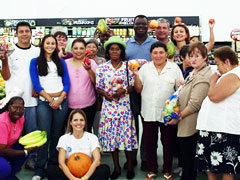Build a Program Clinic-Community Partnerships

People who live with diabetes make most of their self management choices in the course of their daily lives, outside the healthcare setting. Community resources and supports for diabetes care and management are, therefore, an essential complement to high quality medical management of diabetes. A promising strategy for building community supports for diabetes care is the creation of partnerships among clinics and community-based organizations. Working together extends the range, variety and coordination of services available and builds the capacity of the partnership to respond to the needs of their population. (Click here to download an overview presentation on Clinic-community Partnerships)
Partnering to Build Community Supports
The Building Community Supports for Diabetes Care (BCS) projects of the Robert Wood Johnson Foundation Diabetes Initiative demonstrate how clinic-community partnerships can strengthen the community environment and improve the continuum of services and supports that individuals need to manage their diabetes. These projects illustrate various levels of partnerships. The number and types of agency partners varies, from one clinic working with one community organization to broad networks of agencies working together. Examples of BCS partners include:
- public health departments
- faith-based organizations
- local businesses
- fitness and wellness centers
- pharmaceutical companies
- universities and university extension agencies
- Area Health Education Centers
- parks and recreation departments
- social service organizations
Successful Collaboration
The BCS grants gave communities the opportunity to rally around a health issue that is challenging the
entire population. Although the approaches varied across sites, a number of themes emerged. Factors contributing to successful clinic-community partnerships include:
- time to build trust
- attention to the process of collaboration
- a shared understanding of the goals of the partnership
- involvement of the population to be served
- a broader vision
- recognition of and respect for everyone’s contributions
- acknowledgement/ celebration of successes
Some partners contributed materially by offering programs, services, supplies, space, funds, staff time volunteers, etc. Others contributed in intangible ways, e.g., providing access to populations and services, expertise, opportunity and credibility.
BCS projects included, and went beyond, reciprocal referrals for services. Partners worked together to create or improve community resources and supports for self management using the contributions of all the partners.
|

